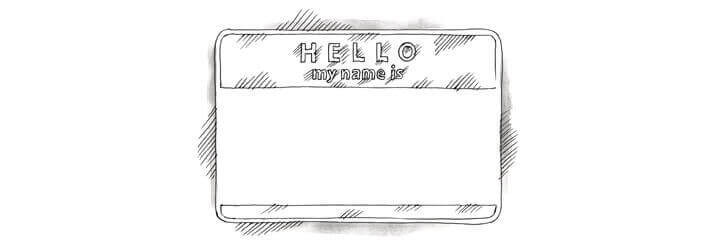What’s in a name? When it comes to your business, just about everything. The name of your business is literally the first thing prospective customers learn about you. The right name can trigger interest, get some buzz going and pave the way to customer interaction. The wrong name fails to register on anyone’s radar or, worse, becomes known for all the wrong reasons.
So while you focus your time and resources on developing your business around a new product or service, don’t leave the business name to the last minute and then go with whatever “feels right.” Take time to consider possible options and bounce your best ideas off trusted friends and advisors.
Here’s advice on what not to do as part of the naming process:
Base the name on your product or service. This may seem like a good starting point, but it can end up hurting you in the long run. “Perfect Plumbing Supplies” sounds good when the business is small, but as it grows and eventually expands its range of offering—say, by coming out with a designer bathroom-décor service—the name becomes limiting and misleading.
Do what everyone else does. There may be other brand names within your industry that are particularly well-known and you think, why not use a slight variation and piggy-back on their brand-name recognition? What ends up happening in the minds of your target audience is the idea that there’s nothing particularly distinctive about you or your business. And if your brand can’t be differentiated from the competition, what reason does anyone have to buy from you?
Use your own name or family initials. Think about it. A name like “Arnold Liefstater Furniture” carries no meaning or resonance outside of a small circle of cousins, aunts and uncles. Not only that—the name is difficult for prospective customers to either spell or pronounce correctly. (Shrinking it to initials, as in “A.L. Furniture,” doesn’t make the name any more memorable.)
Incorporate your city or region in the name. Like basing the name on a product, a geographic strategy for naming your business is unnecessarily limiting. “Newark Pet Grooming” says nothing about the quality or distinctiveness of your service—only that residents of Newark might decide to check you out. Should you later choose to expand the business and/or relocate elsewhere, a name based on a city or area can actually become a liability.
Get too many people involved. Choosing a name for your business is not something you want decided by committee. The process can drag out interminably and you may end up selecting a name solely on the basis that a majority of the 35 people you consulted deemed it “OK.” A better option is running your favorite ideas past a handful of your closest professional advisors or, if you have access to them, a select number of individuals in your target market.
Move forward without checking trademark status. Don’t be one of those small businesses that latch onto the “perfect” name and start using it without doing a basic trademark search. These days, it’s easy enough to conduct a free online search of existing, trademarked business names. Start with a local search and then expand to make sure no other business in the country has already claimed the name.
Finding the right name for your business will take time, but the long-range consequences are enormous. If the task seems insurmountable, consider enlisting the services of a branding agency that has knowledge of your intended market.



